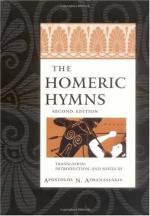As a nature-god of the Heaven he marries the Earth. The tendency of men being to claim descent from a God, for each family with this claim a myth of a separate divine amour was needed. Where there had existed Totemism, or belief in kinship with beasts, the myth of the amour of a wolf, bull, serpent, swan, and so forth, was attached to the legend of Zeus. Zeus had been that swan, serpent, wolf, or bull. Once more, ritual arose, in great part, from the rites of sympathetic magic.
This or that mummery was enacted by men for a magical purpose, to secure success in the chase, agriculture, or war. When the performers asked, “Why do we do thus and thus?” the answer was, “Zeus first did so,” or Demeter, or Apollo did so, on a certain occasion. About that occasion a myth was framed, and finally there was no profligacy, cruelty, or absurdity of which the God was not guilty. Yet, all the time, he punished adultery, inhospitality, perjury, incest, cannibalism, and other excesses, of which, in legend, he was always setting the example. We know from Xenophanes, Plato, and St. Augustine how men’s consciences were tormented by this unceasing contradiction: this overgrowth of myth on the stock of an idea originally noble. It is thus that I would attempt to account for the contradictory conceptions of Zeus, for example.
As to Apollo, I do not think that mythologists determined to find, in Apollo, some deified aspect of Nature, have laid stress enough on his counterparts in savage myth. We constantly find, in America, in the Andaman Isles, and in Australia, that, subordinate to the primal Being, there exists another who enters into much closer relations with mankind. He is often concerned with healing and with prophecy, or with the inspiration of conjurers or shamans. Sometimes he is merely an underling, as in the case of the Massachusetts Kiehtan, and his more familiar subordinate, Hobamoc. {30} But frequently this go-between of God and Man is (like Apollo) the Son of the primal Being (often an unbegotten Son) or his Messenger (Andaman, Noongaburrah, Kurnai, Kamilaroi, and other Australian tribes). He reports to the somewhat otiose primal Being about men’s conduct, and he sometimes superintends the Mysteries. I am disposed to regard the prophetic and oracular Apollo (who, as the Hymn to Hermes tells us, alone knows the will of Father Zeus) as the Greek modification of this personage in savage theology. Where this Son is found in Australia, I by no means regard him as a savage refraction from Christian teaching about a mediator, for Christian teaching, in fact, has not been accepted, least of all by the highly conservative sorcerers, or shamans, or wirreenuns of the tribes. European observers, of course, have been struck by (and have probably exaggerated in some instances) the Christian analogy. But if they had been as well acquainted with ancient Greek as with Christian theology they would have remarked that the Andaman,




